


ChessBase 17 - Mega package - Edition 2024
It is the program of choice for anyone who loves the game and wants to know more about it. Start your personal success story with ChessBase and enjoy the game even more.
I was quite excited by the concept of retro-computing after my latest acquisition from eBay www.ebay.com and seeing a photo of Susan Polgar in a recent story on this site utilizing an Atari ST (circa 1985) with the earliest of ChessBase. The auction I won was for a Commodore VIC-20, a.k.a. "The Friendly Computer" complete with joystick and Datasette unit.
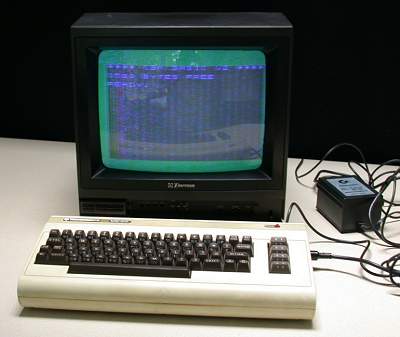
At any one time several of these retired machines are up for grabs with the winning bid only a fraction of the original retail price of approximately 300 USD. The sale sticker of $97.70 was still in place on the box, apparently my VIC was a former leftover deal from the then department store giant Kmart. Astonishingly my winning bid along with the shipping charge and insurance totaled slightly less! Indeed sales were good, the VIC-20 is regarded as the first computer to sell in excess of a million, hence the bountiful supply of discards.
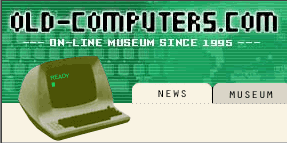 A
little research on the VIC-20 reveals that it was introduced in 1980. It was
made available to American enthusiasts a short time later in 1981, the exact
month remains disputed. VIC is an acronym for video interface chip, the "20"
possibly refers to the amount of characters per line, but other theories have
also circulated about the choice of this number. A proprietary processor ran
slightly better than 1megahertz with an expandable 5 kilobytes of memory. A
virtual museum tour of 700+ classics can be found at www.oldcomputers.com.
A
little research on the VIC-20 reveals that it was introduced in 1980. It was
made available to American enthusiasts a short time later in 1981, the exact
month remains disputed. VIC is an acronym for video interface chip, the "20"
possibly refers to the amount of characters per line, but other theories have
also circulated about the choice of this number. A proprietary processor ran
slightly better than 1megahertz with an expandable 5 kilobytes of memory. A
virtual museum tour of 700+ classics can be found at www.oldcomputers.com.
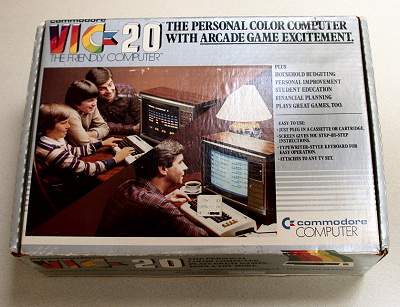
The very large package sat unopened a week or two since I did not have an immediate reason to indulge myself, for my VIC did not include any chess software. The prevalent chess engine (this phrase was not openly tossed about until many years later; a certain insider attributes the term to programming pioneer David Kittinger) commercially available in this era was Sargon, specifically the second version designed for a VIC-20. This proved almost as easy to obtain on eBay, again at significantly less cost than two decades ago.
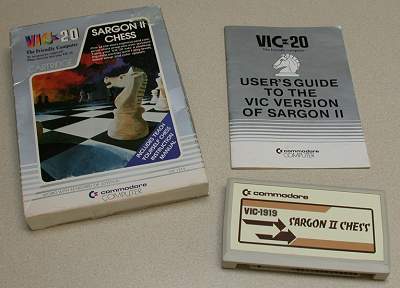
According to Dan and Kathe Spracklen's book (Sargon A Computer Chess Program, Hayden, 1978) the program was written in Z-80 assembly language using the TDL Macro Assembler. They affirm, "The move logic is the heart of SARGON." This was surely to be expected considering the state of all hardware at the time. Nonetheless it was an instant success, winning the 1978 West Coast Computer Faire tournament with a perfect score. The origin of the program's name can be found here.
The estimated playing strength of Sargon II on a VIC-20 falls drastically short of a respectable tournament player, however I didn't procure the couple for the sake of analysis or to have a strong chess partner available, it was simply to relive first hand the fledgling years of home computer chess.
On the surface it is quite straightforward, two or three cables, a keyboard and a television set with nothing to install or configure. Just plug in the cartridge and viola, today's modern chess player has been transported back in time to when there was still proper interzonals.
Much like an aged athlete with weary bones from a quarter century past, the VIC-20 did not have another performance left beyond the perfunctory warm up. Momentarily the intermittently flashing rectangle greeted me; according to the manual this is the VIC's way of saying "it's ready."
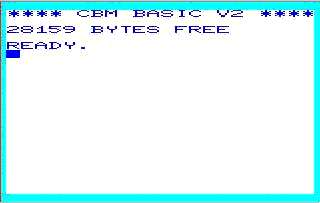
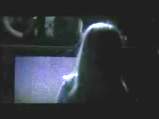 Ready
and willing, but not able; for what soon appeared on the display is without
doubt a precursor to today's infamous blue
screen of death. The noise accompanying the snow reminded me of the smash
movie, Poltergeist,
which is coincidently from this period. The film made "They're here!"
a household expression. Alas hours of toil proved hopeless trying to revive
the elderly appliance. The manual's troubleshooting chart was of no help as
the static confirmed that my VIC was permanently debilitated.
Ready
and willing, but not able; for what soon appeared on the display is without
doubt a precursor to today's infamous blue
screen of death. The noise accompanying the snow reminded me of the smash
movie, Poltergeist,
which is coincidently from this period. The film made "They're here!"
a household expression. Alas hours of toil proved hopeless trying to revive
the elderly appliance. The manual's troubleshooting chart was of no help as
the static confirmed that my VIC was permanently debilitated.
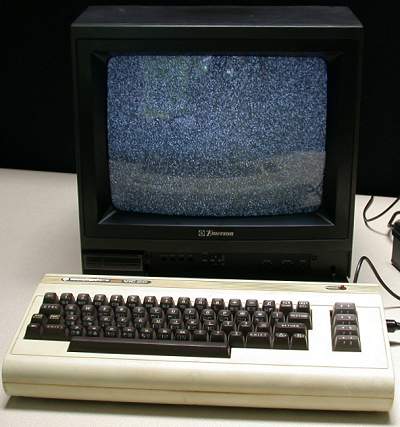
Items sold on eBay give a brand new meaning to the terms "as is" and caveat emptor. It was ironic that the warranty cards for both the VIC-20 and Datasette were found in pristine condition at the bottom of their boxes. Emulators are an excellent alternative to circumvent a similar heartbreaking DOA scenario. The latest version of the Versatile Commodore Emulator (VICE) can be downloaded from http://viceteam.bei.t-online.de; or http://www.cd-r-direct.co.uk/COMMODORE.htm offers The Ultimate Commodore Game Collection at a nominal cost. This disk which should undoubtedly contain Sargon II appears to be a wonderful compendium that includes numerous emulators and 2000 entertaining programs.
Perusing the Internet strongly suggests that there is still considerable interest in this particular and well matched combination, albeit for curiosity sake. The VIC-20 was soon to be overshadowed by the look-alike, but vastly improved Commodore 64 while the trail of Sargon grows cold after the release of the fifth version.
It is certainly left to the free will of the individual on choosing whether to risk buying a secondhand item or enjoying the VIC and Sargon virtually on a modern machine. As for myself, perhaps there will be another time when I will endeavor to complete my visit to bygone days, but for now I feel that it is best to not delve any deeper. Things uncovered are often not as we remembered them, especially once life is experienced here in the future.
 If
you have a working VIC-20 system and wish to try out James DuBois' Sargon
program please contact
us (subject: "VIC-20, Sargon")
If
you have a working VIC-20 system and wish to try out James DuBois' Sargon
program please contact
us (subject: "VIC-20, Sargon")Other articles by James DuBois (picture right)